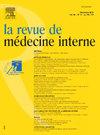法国巨细胞动脉炎诊治方案。
IF 0.7
4区 医学
Q3 MEDICINE, GENERAL & INTERNAL
引用次数: 0
摘要
巨细胞动脉炎(GCA)是一种大血管炎,主要影响 50 岁以上的女性。GCA 通常累及颈外动脉分支,引起头痛、头皮触痛和下颌跛行等症状。最严重的并发症是眼部受累,包括急性前部缺血性视神经病变,以及较少见的视网膜中央动脉闭塞,有永久失明的危险。约 40% 的患者可能会累及主动脉或其分支,预后较差,但在诊断时往往没有症状。诊断主要依据成像技术,如 FDG-PET 结合 CT、CT 血管造影或主动脉及其分支的 MRI 血管造影。30-50% 的多发性风湿痛与 GCA 相关,但也可能单独发生。出现眼部症状或强烈怀疑 GCA 时必须立即开始治疗,以防止视力丧失。确诊的金标准是颞动脉活检。不过,多普勒超声和血管成像也是可靠的诊断技术。治疗初期,主要使用大剂量皮质类固醇,如强的松(每天 40-80 毫克)。可以讨论将托珠单抗与泼尼松联合使用,以减少皮质类固醇的用量。长期管理至关重要,包括监测疾病复发和皮质类固醇相关副作用。全科医生在早期诊断、引导患者前往专科中心以及与专科医生合作管理持续治疗方面发挥着至关重要的作用。这种合作对于解决心血管事件等潜在的长期并发症至关重要。这些并发症可能在 GCA 诊断后五到十年内发生,即使疾病已不再活跃,这意味着由于患者的年龄和状况,需要对其进行警惕性随访。本文章由计算机程序翻译,如有差异,请以英文原文为准。
French protocol for the diagnosis and management of giant cell arteritis
Giant cell arteritis (GCA) is a large-vessel vasculitis that mainly affects women over fifty. GCA usually involves branches from the external carotid arteries, causing symptoms such as headaches, scalp tenderness, and jaw claudication. The most severe complication is ophthalmologic involvement, including acute anterior ischemic optic neuropathy and, less frequently, central retinal artery occlusion with a risk of permanent blindness. Approximately 40% of patients may have involvement of the aorta or its branches, which has a poor prognosis, although this is often asymptomatic at diagnosis. Diagnosis is largely based on imaging techniques such as FDG-PET combined with CT, CT angiography, or MRI angiography of the aorta and its branches. Polymyalgia rheumatica is associated with GCA in 30–50% of cases but may also occur independently. Treatment must be initiated urgently in the presence of ophthalmologic signs or when GCA is strongly suspected to prevent vision loss. The gold standard to confirm the diagnosis is temporal artery biopsy. However, Doppler ultrasound and vascular imaging are also reliable diagnostic techniques. Initially, high doses of corticosteroids like prednisone (40–80 mg per day) are the mainstay of treatment. Tocilizumab can be discussed in combination with prednisone for corticosteroid sparing. Long-term management is essential, including monitoring for disease recurrence and corticosteroid-related side effects. General practitioners play a crucial role in early diagnosis, directing patients to specialized centres, and in managing ongoing treatment in collaboration with specialists. This collaboration is essential to address potential long-term complications such as cardiovascular events. They can occur five to ten years after the diagnosis of GCA even when the disease is no longer active, meaning that vigilant follow-up is required due to the patients’ age and status.
求助全文
通过发布文献求助,成功后即可免费获取论文全文。
去求助
来源期刊

Revue De Medecine Interne
医学-医学:内科
CiteScore
0.70
自引率
11.10%
发文量
526
审稿时长
37 days
期刊介绍:
Official journal of the SNFMI, La revue de medecine interne is indexed in the most prestigious databases. It is the most efficient French language journal available for internal medicine specialists who want to expand their knowledge and skills beyond their own discipline. It is also the main French language international medium for French research works. The journal publishes each month editorials, original articles, review articles, short communications, etc. These articles address the fundamental and innumerable facets of internal medicine, spanning all medical specialties. Manuscripts may be submitted in French or in English.
La revue de medecine interne also includes additional issues publishing the proceedings of the two annual French meetings of internal medicine (June and December), as well as thematic issues.
 求助内容:
求助内容: 应助结果提醒方式:
应助结果提醒方式:


